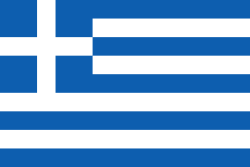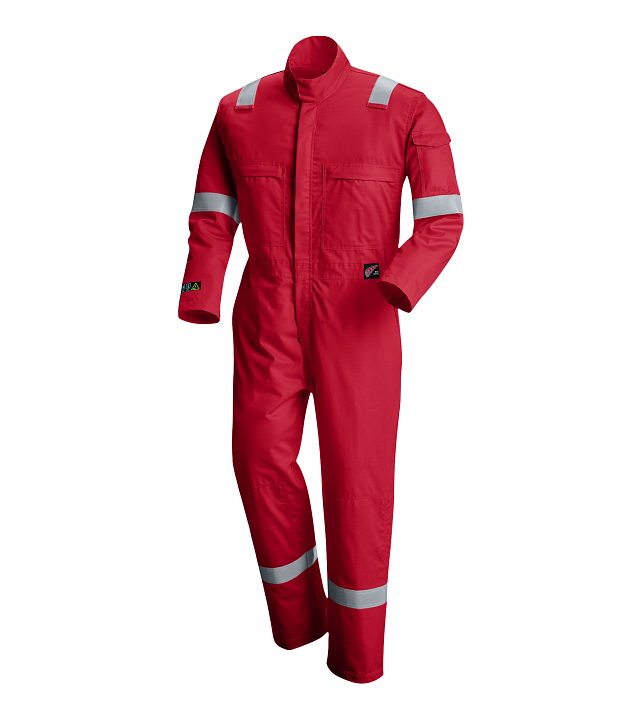76652 FR Antistatic Coverall, 350g
This coverall has a classic look and a great fit. It features eight pockets, non-sparking YKK® zips and press studs throughout. Major seams are double- or triple- stitched and stress points are bar-tacked for strength.
Material: Daletec® FR 98% Cotton, 2% Antistat, 10.5 oz/yd²/350 g/m²
Sizes: XS-4XL, Reg
Compliance: EN ISO 11612, EN 1149-5, IEC 61482-2 (Class 1)
Technologies: Flame Resistant Garment, Anti-Static Garment, Electric Arc Flash Protection
Colors: Navy Blue(53), Royal Blue(54), Red(55), Orange(57)
Features
A) Concealed two-way, black high-density polyester coil zip with press stud closure
B) Two chest pockets with zip closure and storm flaps
C) One sleeve pocket
D) Action back pleats for freedom of movement and comfort
E) Two radio loops
F) Elasticized waistband
G) Two back pockets with flaps
H) Two side pockets with hidden exterior-to-interior access
I) Internal knee pad pockets (knee pads sold separately)
J) Tool pocket on right leg
K) Concealed press button on cuffs
L) 2" (50mm) wide reflective FR striping around arms, legs and over the shoulders
EN ISO 11612 Heat & Flame
This test uses standard methods and conditions to predict the performance of fabric/garments in the event of contact with heat or flames. Specific testing is listed below: Dimensional change, Limited flame spread (A1+A2), Convective heat (B) - 3 levels, Radiant heat (C) - 4 levels, Molten aluminium splash (D) – 3 levels, Molten iron splash (E) – 3 levels, Contact heat (F) – 3 levels (temperature 250 degrees Celsius)Details
IEC 61482-2 Protective Clothing Thermal Arc Hazards
Standard for protective clothing against the thermal effects of an electric arc event. Two different test methods: Open Arc IEC 61482-1-1 and Box test EN 61482-1-2. OPEN ARC - IEC 61842-1-1 (USA). The first result, ELIM - The maximum incident energy (cal/cm²) the garment can withstand before the wearer would have a 0% probability of a second degree burn. The second result is either: ATPV (Arc Thermal Performance Value, cal/cm²) The maximum incident energy the garment can withstand before the wearer would have 50% probability of a second degree burn or EBT (Energy Break Open Threshold, cal/cm²) The incident energy at which a 50% probability of a breakopen occurs resulting in a second degree burn. Since ELIM indicates an energy value at 0% probability of a second degree burn and ATPV/EBT at 50% probability, the ELIM value is usually lower than ATPV/EBT. Large differences between the ELIM and ATPV/EBT results highlight the importance of wearing several layers of garments to ensure you are properly protected. EN 61482-1-2 (Europe) is evaluated in two classes in the same test: APC1 protects against electric arc of 4kA (arc energy 168 kJ), APC2 protects against electric arc of 7kA (arc energy 320 kJ). Unlike the American standard, there is not a result scale in this garment tests, only two levels where the garment either passes or fails. A garment with one layer of Flame Retardant fabric usually passes APC 1 - even thin shirt fabrics. To pass APC 2, a system with two or three fabric layers or a lined garment is normally required. This makes it more difficult to adapt the protection to the risk, without compromising on comfort. As APC 1 is a relatively low level of protection, we always recommend a basic protection of at least 8 cal/cm².Details
EN 1149 Anti-Static (ATEX)
This standard specifies PPE Clothing used in explosive environments (i.e. ATEX) where there is a risk that the garments could create sparks (source of ignition), which in turn could ignite explosive materials. Anti-Static garments marked EN 1149-5 are intended to be worn in Atex zones 1, 2, 20, 21 and 22. In oxygen enriched atmospheres or in zone 0, the Anti-Static garments should not be used without first being approved by a qualified Safety Engineer, as wear and tear can affect the protection of the garment and it is crucial that they are worn the correct way in these environments.Details
Treated FR Garments
FR treated fabrics are based on cotton, blended with polyester, para-aramid or polyamide. These fabrics get their FR property from the chemical treatment that is applied to the fabric. This chemical treatment is executed in such a way that it fully penetrates the fiber and as such is bonded throughout the entire fabric. As a result of this treatment, the fabric becomes flame retardant and keeps this property during the lifetime of the garment. PROS: very good protection against molten metal, good protection against heat and ARC, relatively cheap, good value for money in dirty environments where expected lifespan is not very long. CONS: wash fastness is typically not very good (pale look after several washes), to achieve similar FR properties as inherent FR the fabrics typically become a bit heavier and therefore tend to be a bit less comfortable.Details
Share this product:
| Color | RER Red or ORR Orange or RBR Royal Blue or NAR Navy |
| UK-EU/Int Men Jacket/Coverall Sizes | 36 - 46/S-Chest 88-92 cm or 38 - 48/S-Chest 92-97 cm or 40 - 50/M-Chest 97-102 cm or 42- 52/L-Chest 102-107 cm or 44 - 54/L-Chest 107-112 cm or 46 - 56/XL-Chest 112-117 cm or 48 - 58/XL-Chest 117-122 cm or 50 - 60/XXL-Chest 122-127 cm or 52 - 62/XXL-Chest 127-132 cm or 54 - 64/3XL-Chest 132-137 cm or 56 - 66/4XL-Chest 137-142 cm or 58 - 68/4XL-Chest 142-147 cm or 60 - 70/5XL-Chest 147-152 cm |
Once the user has seen at least one product this snippet will be visible.





